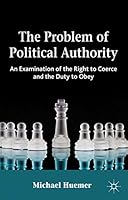
## Metadata
- Author: [[Michael Huemer]]
- Full Title: The Problem of Political Authority
- Category: #books
## Highlights
- Bertrand Russell has said, ‘[T]he point of philosophy is to start with something so simple as not to seem worth stating, and to end with something so paradoxical that no one will believe it.’ ([Location 1050](https://readwise.io/to_kindle?action=open&asin=B00AINH80O&location=1050))
- Granted, the ideal system is one in which people serve justice for the right reasons. But for the reasons explained in Chapter 9, government is unlikely to be that system. If one must choose between a system in which people serve self-interest in the name of justice and one in which people serve justice in the name of self-interest, surely we must prefer the latter. ([Location 5700](https://readwise.io/to_kindle?action=open&asin=B00AINH80O&location=5700))
- On a theoretical level, it is not difficult to understand why government police might be less effective than private protection agencies. If a protection agency provides poor protection or charges excessive fees, it must fear loss of customers to rival agencies. But if the police provide poor protection at a high price, they need have no fear of losing market share or going out of business. ([Location 5748](https://readwise.io/to_kindle?action=open&asin=B00AINH80O&location=5748))
- The fundamental idea behind arbitration as a strategy for reaching such a resolution is that the parties seek something that they can agree upon that might be used to generate a solution to the original dispute. Given that goal, it makes sense for both parties to choose an arbitrator who is generally viewed in their society as fair. ([Location 6159](https://readwise.io/to_kindle?action=open&asin=B00AINH80O&location=6159))
- The self-image of government, almost by its very nature, is that of an agency that functions to combat threats to society through force. Thus, while it is not inevitable, it is natural that governments will react to perceived threats in an aggressive manner that perpetuates the cycle of violence. ([Location 7095](https://readwise.io/to_kindle?action=open&asin=B00AINH80O&location=7095))
- Suppose I develop a plan to render my home secure from burglars and other trespassers: I will plant land mines in my front yard. Clearly, it would be barbarous to discuss this proposal purely in terms of how well it promoted the security of my own home. I would be ethically bound to consider as well such questions as what will happen if neighborhood children stray onto my lawn – even if they are not my children. Similarly, any society is ethically bound to consider how its national security apparatus affects not only its own security but also the security of other peoples around the world. ([Location 7105](https://readwise.io/to_kindle?action=open&asin=B00AINH80O&location=7105))
- As in the case of the land mines on the front lawn, then, we have a strong moral reason for eliminating our government; namely, the threat that it poses to innocent people elsewhere in the world. ([Location 7128](https://readwise.io/to_kindle?action=open&asin=B00AINH80O&location=7128))
- Broadly speaking, the evolution of values has been in the direction of greater respect for persons, a stronger presumption against violence and coercion, and a recognition of the equal moral status of all persons. This shift in values has driven the trend away from authoritarianism and towards liberal democracy. But these moral values are ultimately not consistent with government in any form. All governments are founded practically upon unjust coercion and philosophically on a claim by the state to a special moral status that sets it above all nongovernmental persons and groups. Equal respect for persons is not compatible with the doctrine of political authority.5 It seems plausible, therefore, that as these trends in moral attitudes advance, the realization may one day dawn on humanity that in fact no one possesses political authority. ([Location 7364](https://readwise.io/to_kindle?action=open&asin=B00AINH80O&location=7364))
- The most controversial step would be to outsource the resolution of criminal cases. This step would be more plausible once we began to view criminal cases, not as disputes between the defendant and the state, but as disputes between the defendant and the crime victim. When viewed in this way, there is no reason why these cases, too, could not be handled through private arbitration. ([Location 7397](https://readwise.io/to_kindle?action=open&asin=B00AINH80O&location=7397))